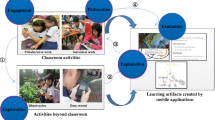Abstract
In the current era of digital technology, computational thinking has become a crucial skill for understanding and analysing the informatics concepts behind every digital occurrence. While research has looked at the effectiveness of technology in education, limited studies have examined the potential of social cognitive learning with a mobile computing approach in develo** computational thinking skills among students. This study aimed to analyse students’ perceptions of social cognitive learning using mobile computing to improve their computational skills. Using quantitative methods and purposive sampling, 135 students from Indonesia and the Philippines who were enrolled in social science subjects, using mobile computing with social science concepts, and interested in participating were surveyed. The study found that most students believed that social cognitive learning using mobile computing could significantly enhance their computational thinking skills. Implications were drawn from the study, such as the need for lecturers to have a thorough understanding of technology, various learning activities, and mobile computing apps to improve students’ computational skills and foster a future-oriented mindset. The appropriate social cognitive teaching stages and class design were also suggested as effective ways of develo** computational thinking skills.
Access this chapter
Tax calculation will be finalised at checkout
Purchases are for personal use only
Similar content being viewed by others
References
Bandura A, Walters RH (1977) Social learning theory, vol 1. Prentice Hall, Englewood cliffs
Schunk DH (2012) Learning theories an educational perspective. Pearson Education, Inc
Valk J, Rashid AT, Elder L (2010) Using mobile phones to improve educational outcomes: an analysis of evidence from Asia. Int Rev Res Open Dist Learn 11(1):117–140
Keegan D (Oct 25–28) The incorporation of mobile learning into mainstream education and training. Paper presented at mLearn 2005—4th world conference on mLearning. South Africa: Cape Town (Retrieved 6 Jan 2012 from http://www.iamlearn.org/public/mlearn2005/www.mlearn.org.za/CD/papers/keegan1.pdf)
Faiola A, Matei SA (2010) Enhancing human–computer interaction design education: teaching affordance design for emerging mobile devices. Int J Technol Des Educ 20:239–254
Dabbagh N, Kitsantas A (2012) Personal learning environments, social media, and self-regulated learning: a natural formula for connecting formal and informal learning. Int High Educ 15(1):3–8
Zou D, **e H, Wang FL (2023) Effects of technology enhanced peer, teacher and self-feedback on students’ collaborative writing, critical thinking tendency and engagement in learning. J Comput High Educ 35(1):166–185
Chatterjee R, Bandyopadhyay A, Chakraborty S, Dutta S (2023) Digital education: the basics with slant to digital pedagogy-an overview. Digital learning based education: transcending physical barriers, pp 63–80
Hossain SFA, Nadi AH, Akhter R, Sohan MAI, Ahsan FT, Shofin MR, Shabab S, Karmoker T, Paul K (2023) Exploring the role of mobile technologies in higher education: the impact of online teaching on traditional learning. Novel financial applications of machine learning and deep learning: algorithms, product modeling, and applications. Springer International Publishing, Cham, pp 197–216
Jurayev TN (2023) The use of mobile learning applications in higher education institutes. Adv Mobile Learn Educ Res 3(1):610–620
Ary D, Jacobs L, Sorensen C (2010) Introduction to research in education, 8th edn. Wadsworth, Canada, p 453
Huberman AM, Miles MB (1994) Data management and analysis methods
Kazimoglu C, Kiernan M, Bacon L, Mackinnon L (2010) Develo** a game model for computational thinking and learning traditional programming through game-play. In: Sanchez J, Zhang K (eds) World conference on e-learning in corporate, government, healthcare, and higher education, pp 1378–1386
Shahangian SA, Tabesh M, Yazdanpanah M (2021) Psychosocial determinants of household adoption of water-efficiency behaviors in Tehran capital, Iran: application of the social cognitive theory. Urban Clim 39:100935
Schunk DH, Mullen CA (2012) Self-efficacy as an engaged learner. Handb Res Stud Engagement 219–235
Cheng PY, Chu MC (2014) Behavioral factors affecting students intentions to enroll in business ethics courses: a comparison of the theory of planned behavior and social cognitive theory using self-identity as a moderator. J Bus Ethics 124:35–46
Rich KM, Binkowski TA, Strickland C, Franklin D (Aug 2018) Decomposition: a K-8 computational thinking learning trajectory. In: Proceedings of the 2018 ACM conference on international computing education research, pp 124–132
Kadhim JQ, Aljazaery IA, ALRikabi HTS (2023) Enhancement of online education in engineering college based on mobile wireless communication networks and IoT. Int J Emer Technol Learn (Online) 18(1):176
Mao Y, You C, Zhang J, Huang K, Letaief KB (2017) A survey on mobile edge computing: the communication perspective. IEEE Commun Surv Tutorials 19(4):2322–2358
Neff KD (2023) Self-compassion: theory, method, research, and intervention. Annu Rev Psychol 74:193–218
Kaufman SB (2023) Self-actualizing people in the 21st century: integration with contemporary theory and research on personality and well-being. J Humanist Psychol 63(1):51–83
Muthmainnah, Obaid AJ, Mahdawi RSA, Khalaf HA (2022) Adoption social media-movie based learning project (SMMBL) to engage students online environment. Educ Adm: Theory Pract 28(01):22–36. https://doi.org/10.17762/kuey.v28i01.321
Perumal S (2022) The quality of interactive e-learning for students to understand the course material. Wasit J Comput Math Sci 1(3):15–23
Author information
Authors and Affiliations
Corresponding author
Editor information
Editors and Affiliations
Rights and permissions
Copyright information
© 2024 The Author(s), under exclusive license to Springer Nature Singapore Pte Ltd.
About this paper
Cite this paper
Al Yakin, A., Obaid, A.J., Muthmainnah, Shnawa, A.H., Haroon, N.H. (2024). Unlocking the Potential of Mobile Computing for Infusing Computational Thinking Using Social Cognitive Approach in Higher Education Institutes. In: Swaroop, A., Polkowski, Z., Correia, S.D., Virdee, B. (eds) Proceedings of Data Analytics and Management. ICDAM 2023. Lecture Notes in Networks and Systems, vol 786. Springer, Singapore. https://doi.org/10.1007/978-981-99-6547-2_9
Download citation
DOI: https://doi.org/10.1007/978-981-99-6547-2_9
Published:
Publisher Name: Springer, Singapore
Print ISBN: 978-981-99-6546-5
Online ISBN: 978-981-99-6547-2
eBook Packages: Intelligent Technologies and RoboticsIntelligent Technologies and Robotics (R0)




